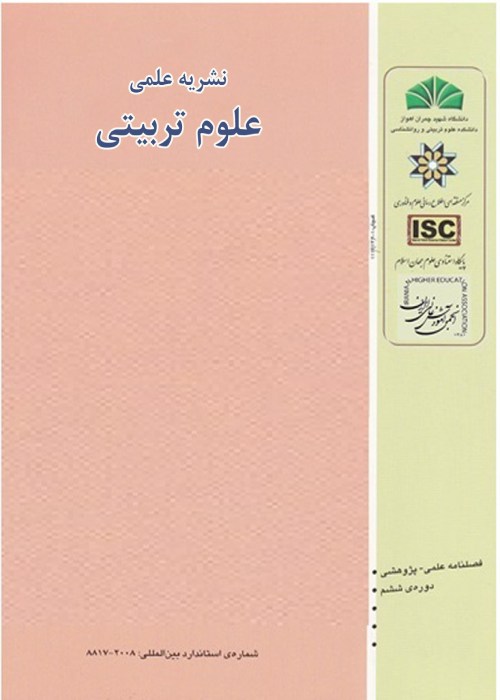Study of the Effectiveness of self-regulation training on mathematical reasoning, selective attention and visual-spatial processing in children with attention deficit/hyperactivity disorder in elementary school
Author(s):
Article Type:
Research/Original Article (دارای رتبه معتبر)
Abstract:
Introduction
Since the academic performance of children with attention-deficit/ hyperactivity disorder in math and math-related areas is affected by their disorder, and nowadays self-regulation training method is prescribed to solve the problems of these children, therefore, the present study aims to study the effectiveness of self-regulation training on selective attention. , spatial perception and mathematical reasoning in elementary school children with attention deficit/hyperactivity disorder was conducted in the academic year 2022.Method
The research method was practical in terms of purpose and quantitative in terms of the nature of the data collected and based on a quasi-experimental approach (pre-test-post-test design with control group). The statistical population consisted of all boys suffering from attention deficit/hyperactivity disorder aged 9 to 12 years (4th to 6th year) in Karaj city who referred to counseling or psychiatric centers during the first 4 months of 1401. 30 students were randomly divided into self-regulated and control training groups. To collect data, the visual-spatial processing subtest questionnaire from the Tehran-Stanford-Binet Modern Intelligence Test, fifth edition, the selective attention test, and the mathematical reasoning subtest of the Tehran-Stanford-Binet Modern Intelligence Test, fifth edition, were used. For the experimental group, training was given in 10 sessions (45 minutes and 2 times a week) and the control group did not receive training during the sessions. The data were analyzed at two descriptive levels (mean and standard deviation) and inferential (single and multivariate covariance analysis) with SPSS-24 and AMOS-21 software.Results
As the results of show, the F values in the variables of selective attention (p=0.16, F=1.90) and visual-spatial perception (p=0.18, F=1.74) were not significant, but F in the solution variable Combined problems (p=0.002, F=7.10) are significant. According to the results, there is a significant difference between the average post-test scores of the mathematical reasoning variable, after checking the scores of the pre-tests, in the test and control groups. Also, according to the effect size, self-regulation training had a 27% effect on mathematical reasoning.Discussion
Self-regulatory skills are critical to the development of math abilities because multiple self-regulatory skills are employed when children attempt to solve math problems. Specifically, children must maintain their attention on relevant information (attentional focus) and keep it in mind while solving a broader math problem (memory work). Inhibitory control is employed when children need to ignore salient yet extraneous information and inhibit counterproductive strategies or incorrect responses. Self-regulatory behavioral measures using multiple self-regulatory skills have also shown a positive relationship with math achievement.Language:
Persian
Published:
Education Journal, Volume:30 Issue: 1, 2023
Pages:
235 to 258
magiran.com/p2592455
دانلود و مطالعه متن این مقاله با یکی از روشهای زیر امکان پذیر است:
اشتراک شخصی
با عضویت و پرداخت آنلاین حق اشتراک یکساله به مبلغ 1,390,000ريال میتوانید 70 عنوان مطلب دانلود کنید!
اشتراک سازمانی
به کتابخانه دانشگاه یا محل کار خود پیشنهاد کنید تا اشتراک سازمانی این پایگاه را برای دسترسی نامحدود همه کاربران به متن مطالب تهیه نمایند!
توجه!
- حق عضویت دریافتی صرف حمایت از نشریات عضو و نگهداری، تکمیل و توسعه مگیران میشود.
- پرداخت حق اشتراک و دانلود مقالات اجازه بازنشر آن در سایر رسانههای چاپی و دیجیتال را به کاربر نمیدهد.
In order to view content subscription is required
Personal subscription
Subscribe magiran.com for 70 € euros via PayPal and download 70 articles during a year.
Organization subscription
Please contact us to subscribe your university or library for unlimited access!


